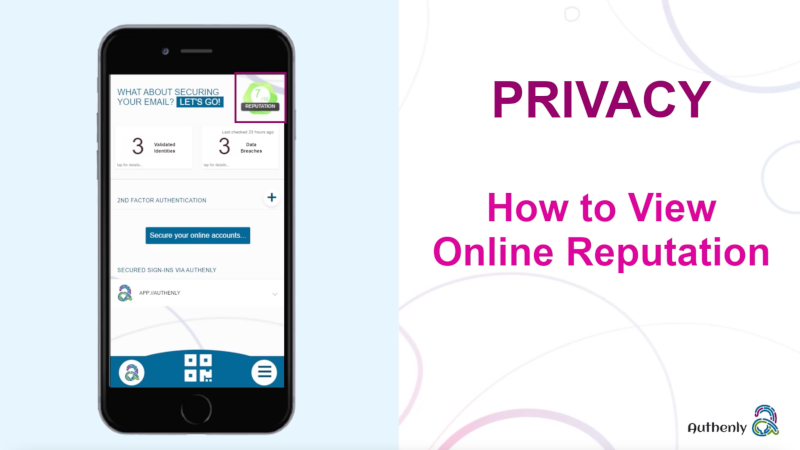On the Internet, each online identity carries a reputation. It is up to you to ensure that at least some of the online identities you use are reputable, to avoid being blacklisted each time you send an email or when you purchase goods online. Be aware also that a bad online reputation can quickly spill over and impact your real world reputation, including employability, credit score, and more...
Be in control!
Each identity carries a reputation
How good is yours?
Just like a financial institution knows all about your credit score, merchant websites, social networks, and infrastructure vendors know all about your online identity's reputation score, and they take it into account when routing your emails, approving your transactions, or allowing access to various online assets.
Get your reputation score based on various sources (positive and negative) found on the internet and on the dark web.
A clear list of actionable tasks to improve and maintain a top online identity's reputation.
Do not let your online identity be flagged as malicious or spammy as it could reduce your ability to transact online.
Understanding your online reputation
Why is your online reputation important?
When you shop online, or even when you make a purchase offline, the supplier will have systems in place to check your reputation.
If you have a low reputation, they may ask for more checks or more guarantees before transacting. If you have a very bad reputation, they will walk away. Therefore, keeping a good online reputation is important in every aspects of your daily life.

What makes you reputable?
There are several criterias weighting in favour or against a good online reputation, and there is no unique magic formula. So we came up with one!
First, we always link an online reputation score to an online identity, generally represented by an email address. As you may have several online identities, each could carry a different online reputation.
Then, we look at positive and negative sources. For example, if we can find that your identity is linked to a Facebook or a LinkedIn account, that will back up your online reputation and make it more real. If we cannot find any legitimate sources, well at worst you may end up with no reputation at all, which some may interpret as suspicious.
Finally, we look into other criteria which are either actual or have happened to your online identity in the past. It can include information such as having been blacklisted, flagged as spammy, or if your online identity got breached.
The score we provide is a percentage 0 (the worst possible online reputation) and 100% (the unachievable Graal of the perfect online reputation).
How can you improve your online reputation?
The first step is to understand where you stand, and which factor is lowering your online reputation.
The first highly influencial factor will always be linked to security. If your online identity is badly protected, no matter what else you do, you are at risk that your account gets taken over, and therefore from this moment, anything (bad in general) can happen.
Therefore, the first step is always to protect your online identity. Considering that your various suppliers do not always have your online protection at the top of their agenda, you will have to select more carefully which supplier you agree to deal with. In this day and age, you have more choices than you have time to evaluate them. If a supplier is asking for a "dodgy login" (you know, the one with ID + password), you would be well advised to give it a pass! You will find others who seem more concerned with protecting your data and your online identity. Then, when you register with them (those with no enforced password!), make sure that you double down on login protection, such as by making use of a 2FA.
Once your account is secure (with all suppliers!), you may want to have a look into alternative positive factors. For example, you may want to register your online identity with some reputable providers, to prove that you exist (you are not a robot!) and that you have a real online activity.
Don’t just take our word for it!
Have a look at what they say...
Join all those individuals, professionals, and businesses who opted to take back control over the security and privacy of their online identity.
Frequently Asked Questions
Have questions? We’ve got answers. If you can’t find what you are looking for, feel free to get in touch.
Authenly is regularly scanning many sources on the internet and on the dark web. We consolidate all sources to create a final reputation score, and we give guidance as to how to improve the score.
Yes, it can. It does not take much for an online reputation to get hit. It could be as simple as you sending an email which was then flagged as spammy by the receiver. Such little action will start making a negative impact, without you even being made aware of it in the first place.








